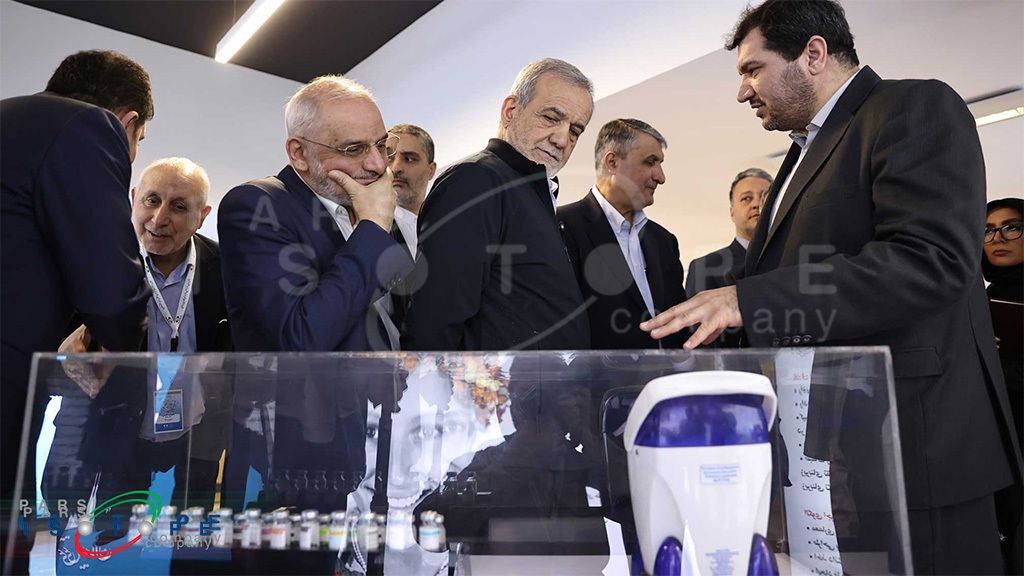Follow Us:
President Unveils Three New Radiopharmaceuticals by Pars Isotope at 19th National Nuclear Technology Festival
At the 19th National Nuclear Technology Festival on April 9, H.E. Dr. Pezeshkian, President of the Islamic Republic of Iran, accompanied by Mohammad Eslami, Vice President and the Head of the Atomic Energy Organization of Iran, unveiled three new products by Pars Isotope alongside other achievements of the nuclear industry.
These three products include PARS-GALO FAPI (Gallium-68 FAPI or Ga-68 FAPI), PARS-LUTO- FAPI (Lutetium-177 FAPI or Lu-177 FAPI), and PARS-Rhen Skin (Rhenium-188 topical cream) radiopharmaceuticals.
PARS-GALO FAPI is a diagnostic radiopharmaceutical that enables high-precision identification of primary tumors and metastatic lesions in numerous solid tumors through PET/CT imaging. As many cancers remain undetected in early stages, this product plays a vital role in improving diagnostic accuracy and enhancing treatment success rates. This radiopharmaceutical enables physicians to accurately diagnosis the size and precise location of both primary tumors and metastatic lesions throughout the patient’s body, thereby facilitating optimal selection of targeted treatment modalities. This product empowers physicians to better assess cancer progression stages, enabling informed decisions regarding surgical intervention, chemotherapy, or alternative therapies – ultimately enhancing treatment success rates and improving patients’ quality of life. PARS-GALO FAPI, certified by the Cancer Research Center of Shahid Beheshti University of Medical Sciences, has been clinically implemented for diagnosing over 30 cancer types including colon, stomach, pancreatic, breast, prostate, and sarcoma cancer. In addition, due to its high sensitivity and precision in detecting diverse metastatic lesions throughout the body, it can be used as a reliable method alongside other diagnostic methods.
PARS-LUTO FAPI is an innovative and advanced product for cancer treatment that, using nuclear medicine technology, directly targets cancer cells. The Lu-177 FAPI radiopharmaceutical, prepared from the lutetium-177 radioisotope, induces cellular death in cancer cells through beta radiation emission without damaging other body cells (unlike other treatment methods, such as chemotherapy). Clinical trial results have demonstrated that this method not only reduces the size of primary tumors and completely eliminates metastatic lesions, but also decreases pain and improves patients’ quality of life. PARS-LUTO FAPI can have a greater impact on the treatment process of patients when combined with classical therapies such as chemotherapy or immunotherapy. Overall, this product represents an advanced and innovative technology in the field of cancer treatment, offering new hope to patients. This method could become one of the primary treatments for various types of cancer in the future, significantly improving treatment success rates and reducing cancer-related mortality.
Treatment with the radioactive Rhenium-188 skin cream is considered a brachytherapy method that utilizes the beta-emitting radioisotope Re-188 for treating non-melanoma skin cancer. The primary purpose of Rhenium-188 skin cream is to serve as a painless, personalized, and non-invasive treatment that precisely targets and eliminates cancerous cells in the affected area requiring treatment. This treatment utilizes an epidermal radioisotope based on the localized cell-killing effect of beta radiation, which induces both direct cellular apoptosis and stimulates localized immune responses for tissue repair. Rhenium-188 (Re-188) is a beta-emitting radioisotope that offers excellent therapeutic advantages. Beta particle emission can penetrate human tissue to a depth of only 2-3 millimeters. Therefore, Rhenium-188 is ideal for treating superficial tissues without affecting other parts of the body. Its half-life of 17 hours enables treatments to be completed within a very short time frame. Given the existing essential infrastructure and domestic production of tungsten/rhenium generators at Pars Isotope Company, the treatment cost with this radiopharmaceutical is significantly reduced for domestic patients compared to neighboring countries. Furthermore, the production of ‘Rhenium-188’ skin cream presents a significant economic opportunity for our country, enabling us to utilize the existing potential for exports to global markets.

